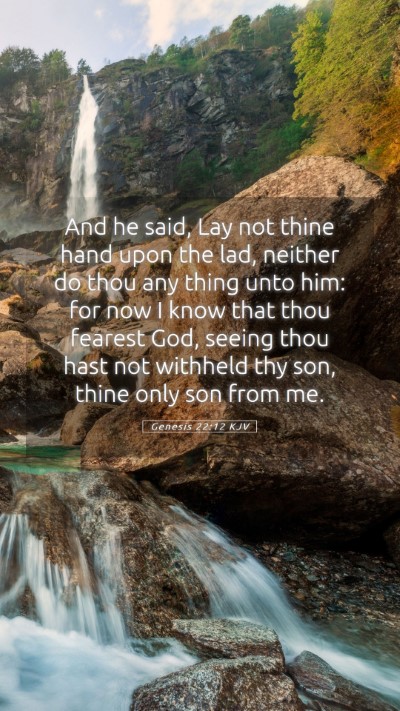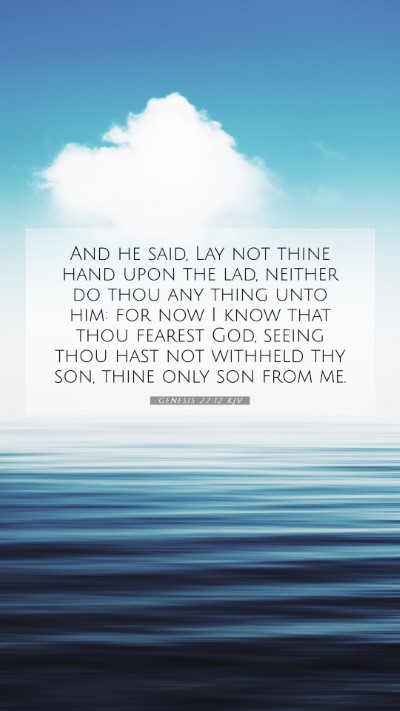Meaning and Interpretation of Genesis 22:12
Genesis 22:12 states: "And he said, Lay not thine hand upon the lad, neither do thou any thing unto him: for now I know that thou fearest God, seeing thou hast not withheld thy son, thine only son from me." This pivotal moment in the Old Testament captures Abraham’s profound faith and obedience to God, serving as a foundational narrative for understanding biblical sacrifice and divine testing.
Bible Verse Meanings and Commentary
The meaning of Bible verses often transcends the literal words. Genesis 22:12 exemplifies this, where God intervenes at a moment of great personal trial for Abraham. Utilizing insights from Matthew Henry, Albert Barnes, and Adam Clarke, we see layered interpretations that enrich our Bible verse interpretations.
Contextual Background
This verse occurs during a critical juncture in Abraham's life when he is commanded to sacrifice his son Isaac. Understanding this command is vital to interpreting the nature of Abraham's faith. According to Matthew Henry, this narrative reflects God's desire for sincere worship over ritualistic sacrifice.
Divine Testing and Human Response
In this passage, God reveals both His omniscience and His expectations for humanity. Albert Barnes expounds that God's command was an ultimate test of loyalty, illustrating the concept of Bible study insights as it pertains to Biblical exegesis. Abraham's willingness to sacrifice Isaac demonstrates the peak of faith in human experience.
The Fear of God
When the Lord states, "now I know that thou fearest God," it isn’t indicative that God lacked knowledge, but rather reflects the completion of Abraham's faith journey. Adam Clarke emphasizes that true fear of God is demonstrated by our actions and decisions, particularly in moments of great sacrifice.
Application in Daily Life
Genesis 22:12 teaches important lessons for understanding Scripture today. Believers are encouraged to reflect on their own lives: Are there areas where God is asking for complete trust and surrender? This passage drives home the point about practical application: the willingness to follow God’s leading, even amidst personal loss or hardship.
Relationship to Other Scriptures
This verse can be cross-referenced with:
- Hebrews 11:17-19 - Highlights Abraham's faith regarding Isaac's resurrection.
- James 2:21-23 - Discusses Abraham's justification by faith through works.
- Romans 4:3 - Points to Abraham's faith being counted as righteousness.
In-depth Bible Verse Analysis
The significance of this scripture extends into themes of faith, obedience, and the nature of God's commands. Engaging in online Bible study or participating in Bible study groups can facilitate deeper understanding and personal reflection on how this passage fits within the broader narrative of salvation history.
Significance of Sacrifice
Genesis 22:12 is often viewed as a foreshadowing of Christ's ultimate sacrifice. The willingness of Abraham to offer his only son parallels God's giving of His only Son, which has deep theological implications for Christians seeking Bible study materials that connect the Old and New Testaments.
Conclusion
Ultimately, Genesis 22:12 serves as a profound verse guiding readers towards understanding not only Abraham's faith but also God's desire for relationship based on trust and obedience. It invites all believers into a deeper examination of their own faith journeys and the application of Bible verses within their lives.
Final Thoughts
For those delving into the historical context of Bible verses or seeking Bible study lessons, Genesis 22:12 stands as a critical text illustrating the dynamic of divine and human interaction through obedience. Continuous reflection on such verses enhances our Bible study plans and materials.


